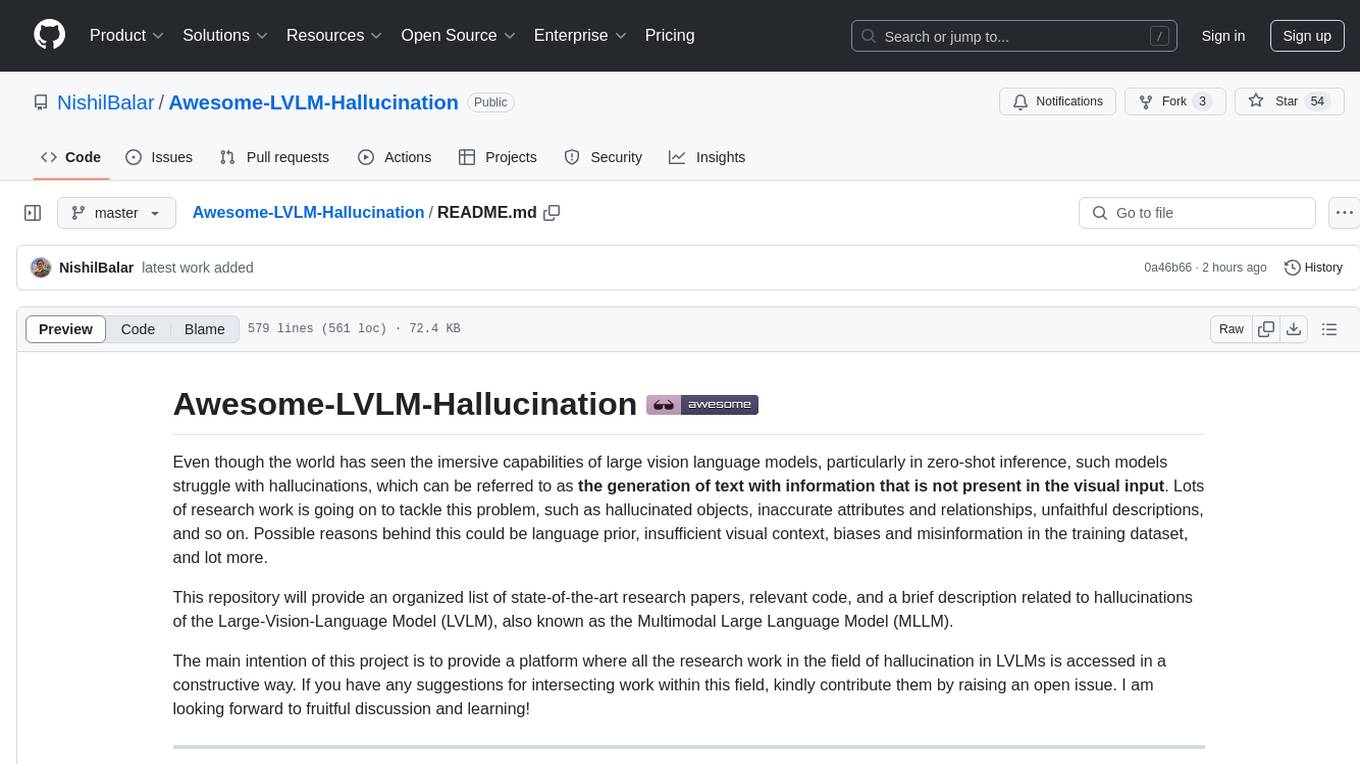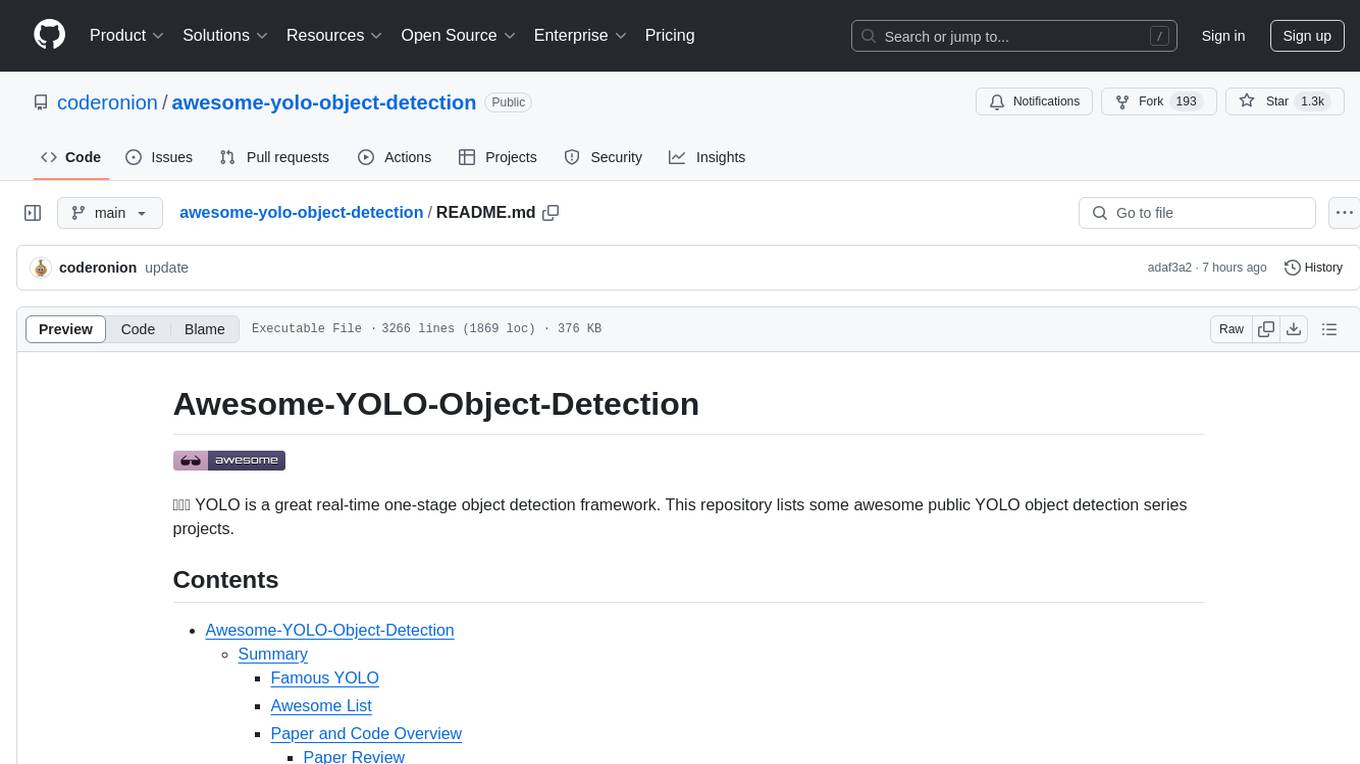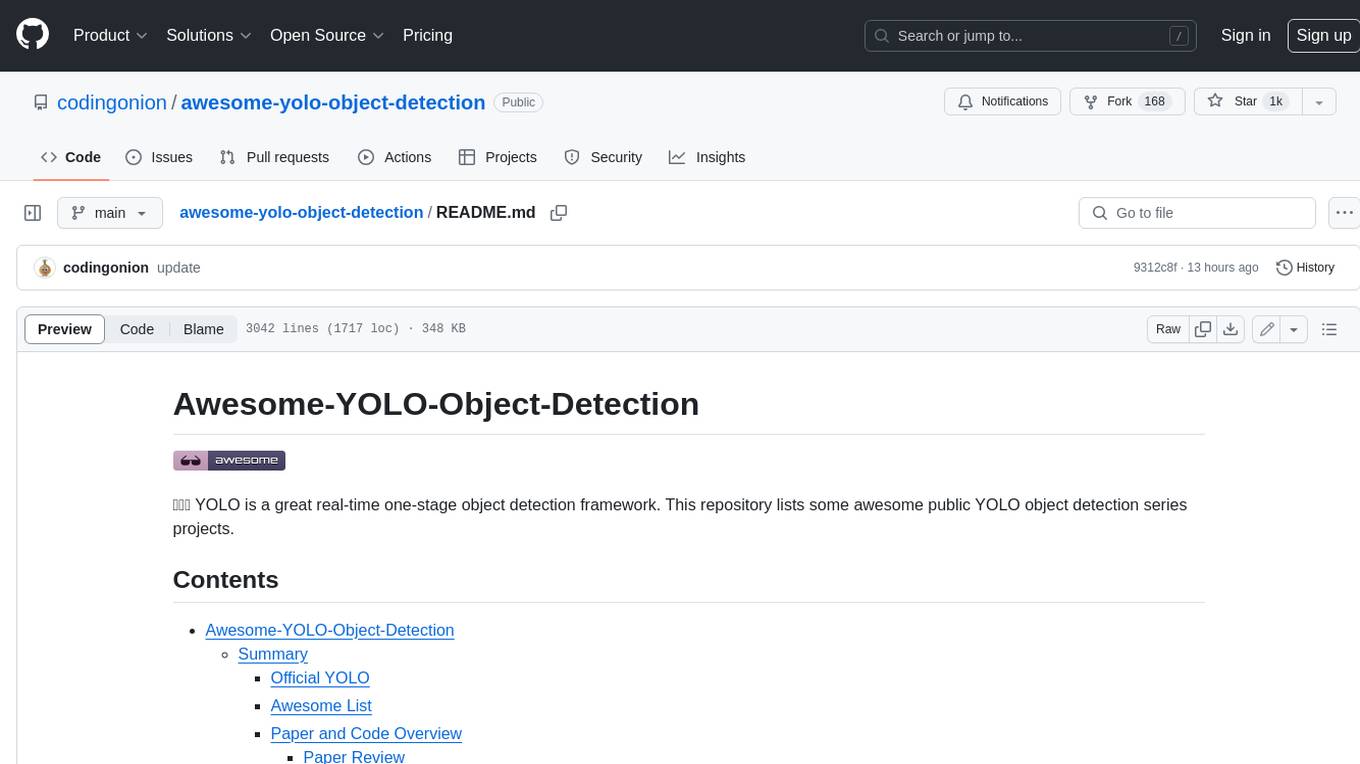
Awesome-LM-SSP
A reading list for large models safety, security, and privacy (including Awesome LLM Security, Safety, etc.).
Stars: 1258
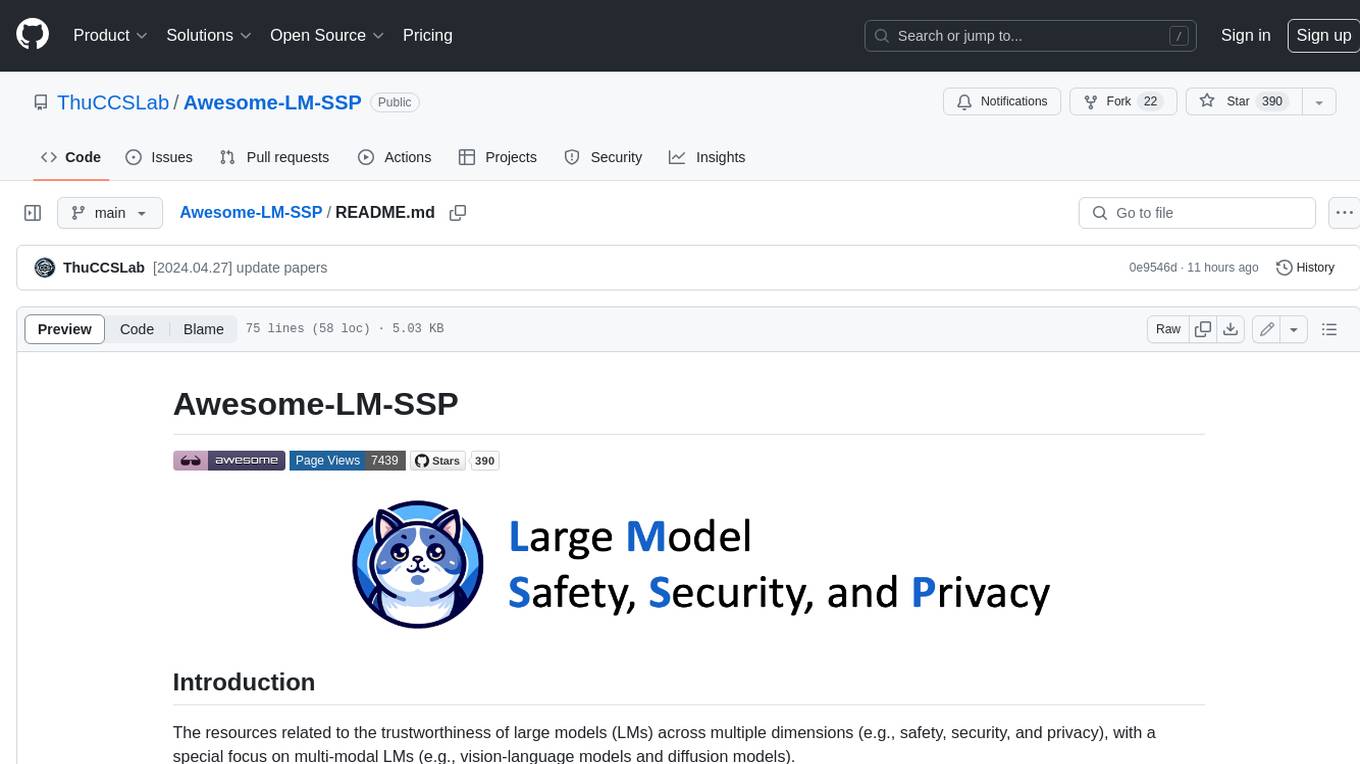
The Awesome-LM-SSP repository is a collection of resources related to the trustworthiness of large models (LMs) across multiple dimensions, with a special focus on multi-modal LMs. It includes papers, surveys, toolkits, competitions, and leaderboards. The resources are categorized into three main dimensions: safety, security, and privacy. Within each dimension, there are several subcategories. For example, the safety dimension includes subcategories such as jailbreak, alignment, deepfake, ethics, fairness, hallucination, prompt injection, and toxicity. The security dimension includes subcategories such as adversarial examples, poisoning, and system security. The privacy dimension includes subcategories such as contamination, copyright, data reconstruction, membership inference attacks, model extraction, privacy-preserving computation, and unlearning.
README:
The resources related to the trustworthiness of large models (LMs) across multiple dimensions (e.g., safety, security, and privacy), with a special focus on multi-modal LMs (e.g., vision-language models and diffusion models).
-
This repo is in progress 🌱 (manually collected).
-
Badges:
-
🌻 Welcome to recommend resources to us via pulling requests or opening issues with the following format:
| Title | Link | Code | Venue | Classification | Model | Comment |
|---|---|---|---|---|---|---|
| aa | arxiv | github | bb'23 | A1. Jailbreak | LLM | Agent |
- [2025.02.17] We collected
12related papers from NDSS'25! - [2024.08.17] We collected
34related papers from ACL'24! - [2024.05.13] We collected
7related papers from S&P'24! - [2024.04.27] We adjusted the categories.
- [2024.01.20] We collected
3related papers from NDSS'24! - [2024.01.17] We collected
108related papers from ICLR'24! - [2024.01.09] 🚀 LM-SSP is released!
- Book (3)
- Competition (5)
- Leaderboard (3)
- Toolkit (10)
- Survey (35)
- Paper (1480)
- A. Safety (812)
- A0. General (22)
- A1. Jailbreak (345)
- A2. Alignment (89)
- A3. Deepfake (65)
- A4. Ethics (5)
- A5. Fairness (54)
- A6. Hallucination (109)
- A7. Prompt Injection (49)
- A8. Toxicity (74)
- B. Security (223)
- B0. General (13)
- B1. Adversarial Examples (89)
- B2. Poison & Backdoor (108)
- B3. System (13)
- C. Privacy (445)
- C0. General (31)
- C1. Contamination (13)
- C2. Copyright (156)
- C3. Data Reconstruction (50)
- C4. Membership Inference Attacks (40)
- C5. Model Extraction (12)
- C6. Privacy-Preserving Computation (88)
- C7. Property Inference Attacks (3)
- C8. Side-Channel (5)
- C9. Unlearning (47)
- A. Safety (812)
-
Organizers: Tianshuo Cong (丛天硕), Xinlei He (何新磊), Zhengyu Zhao (赵正宇), Yugeng Liu (刘禹更), Delong Ran (冉德龙)
-
This project is inspired by LLM Security, Awesome LLM Security, LLM Security & Privacy, UR2-LLMs, PLMpapers, EvaluationPapers4ChatGPT
For Tasks:
Click tags to check more tools for each tasksFor Jobs:
Alternative AI tools for Awesome-LM-SSP
Similar Open Source Tools

Awesome-LM-SSP
The Awesome-LM-SSP repository is a collection of resources related to the trustworthiness of large models (LMs) across multiple dimensions, with a special focus on multi-modal LMs. It includes papers, surveys, toolkits, competitions, and leaderboards. The resources are categorized into three main dimensions: safety, security, and privacy. Within each dimension, there are several subcategories. For example, the safety dimension includes subcategories such as jailbreak, alignment, deepfake, ethics, fairness, hallucination, prompt injection, and toxicity. The security dimension includes subcategories such as adversarial examples, poisoning, and system security. The privacy dimension includes subcategories such as contamination, copyright, data reconstruction, membership inference attacks, model extraction, privacy-preserving computation, and unlearning.
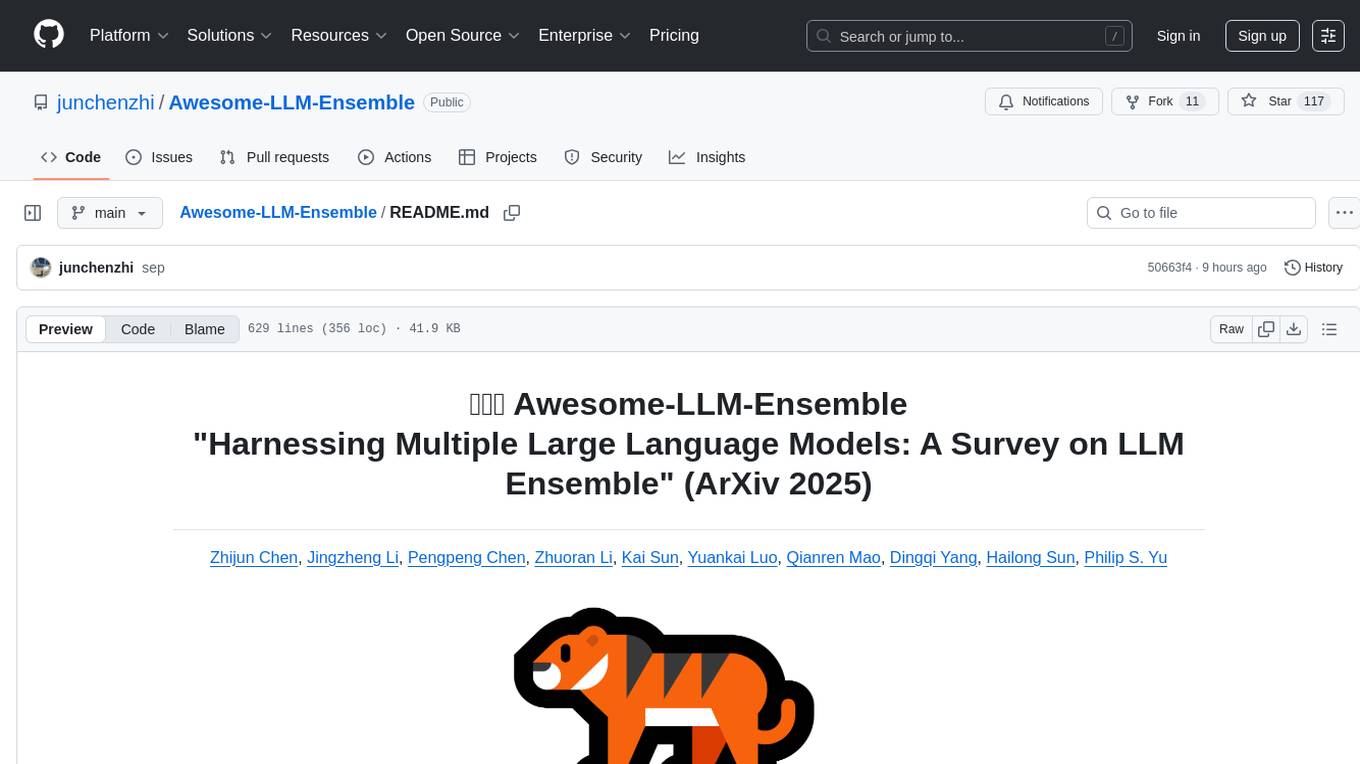
Awesome-LLM-Ensemble
Awesome-LLM-Ensemble is a collection of papers on LLM Ensemble, focusing on the comprehensive use of multiple large language models to benefit from their individual strengths. It provides a systematic review of recent developments in LLM Ensemble, including taxonomy, methods for ensemble before, during, and after inference, benchmarks, applications, and related surveys.
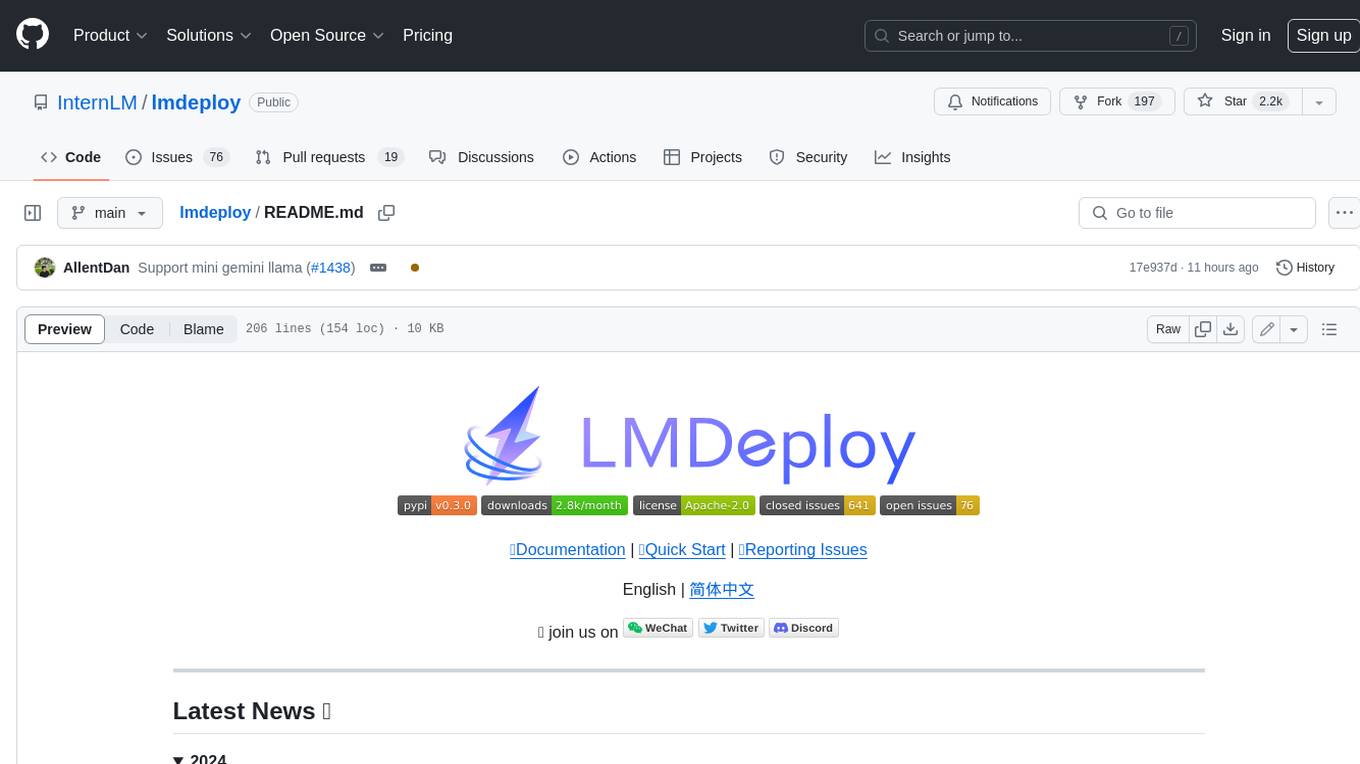
lmdeploy
LMDeploy is a toolkit for compressing, deploying, and serving LLM, developed by the MMRazor and MMDeploy teams. It has the following core features: * **Efficient Inference** : LMDeploy delivers up to 1.8x higher request throughput than vLLM, by introducing key features like persistent batch(a.k.a. continuous batching), blocked KV cache, dynamic split&fuse, tensor parallelism, high-performance CUDA kernels and so on. * **Effective Quantization** : LMDeploy supports weight-only and k/v quantization, and the 4-bit inference performance is 2.4x higher than FP16. The quantization quality has been confirmed via OpenCompass evaluation. * **Effortless Distribution Server** : Leveraging the request distribution service, LMDeploy facilitates an easy and efficient deployment of multi-model services across multiple machines and cards. * **Interactive Inference Mode** : By caching the k/v of attention during multi-round dialogue processes, the engine remembers dialogue history, thus avoiding repetitive processing of historical sessions.
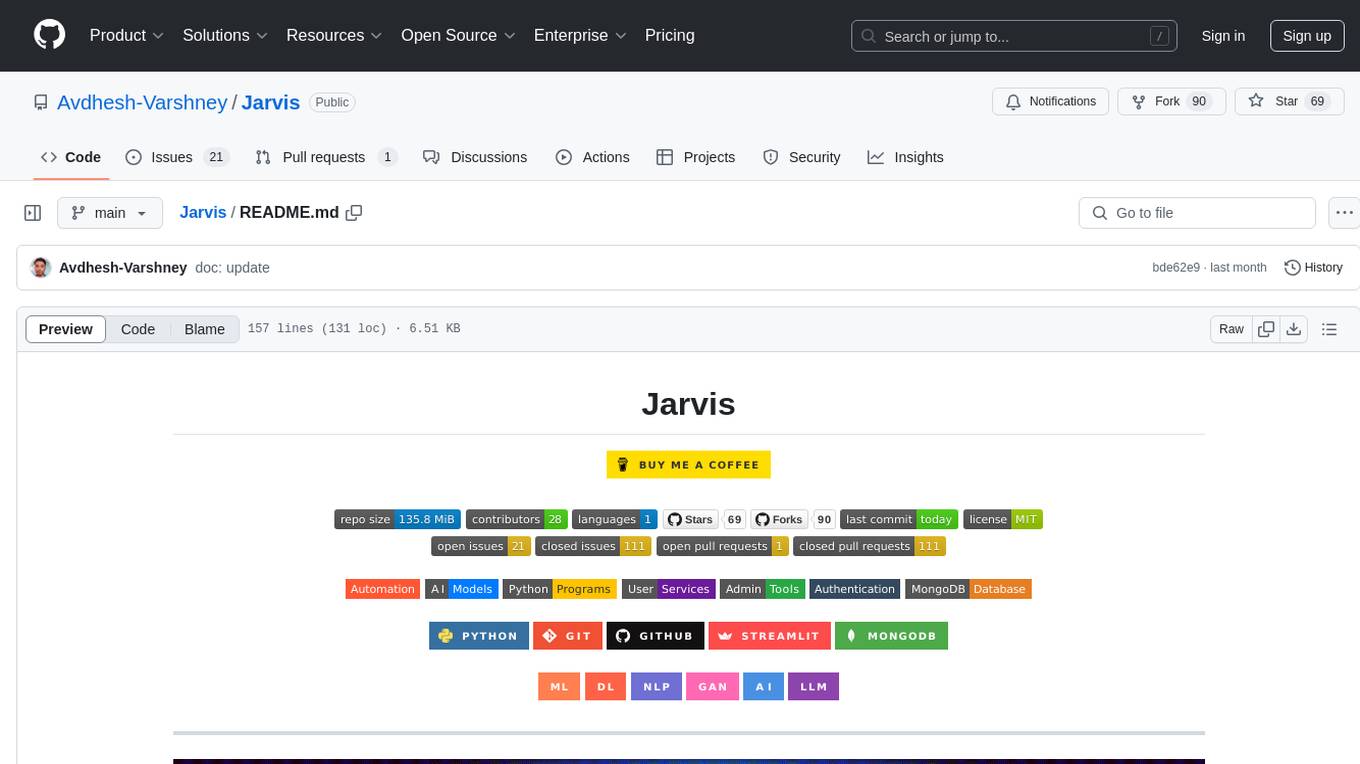
Jarvis
Jarvis is a powerful virtual AI assistant designed to simplify daily tasks through voice command integration. It features automation, device management, and personalized interactions, transforming technology engagement. Built using Python and AI models, it serves personal and administrative needs efficiently, making processes seamless and productive.
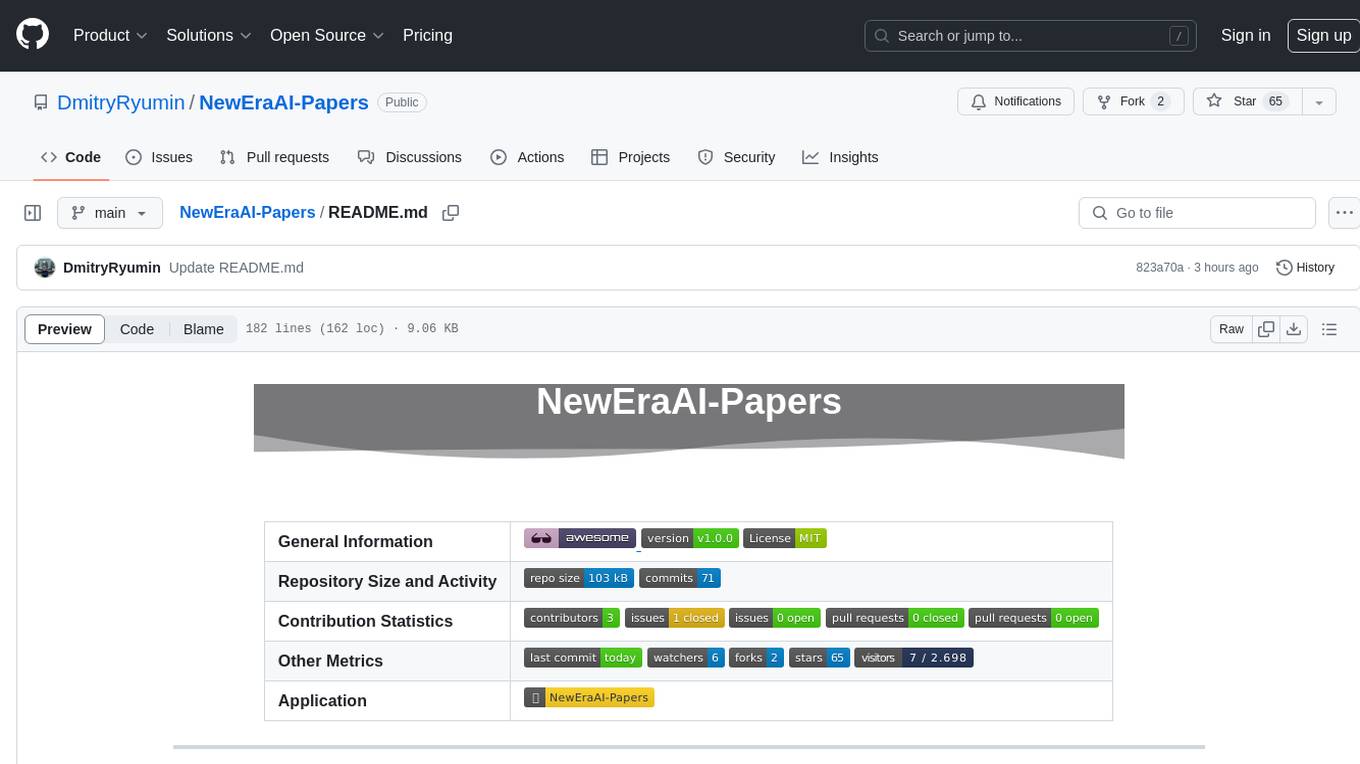
NewEraAI-Papers
The NewEraAI-Papers repository provides links to collections of influential and interesting research papers from top AI conferences, along with open-source code to promote reproducibility and provide detailed implementation insights beyond the scope of the article. Users can stay up to date with the latest advances in AI research by exploring this repository. Contributions to improve the completeness of the list are welcomed, and users can create pull requests, open issues, or contact the repository owner via email to enhance the repository further.
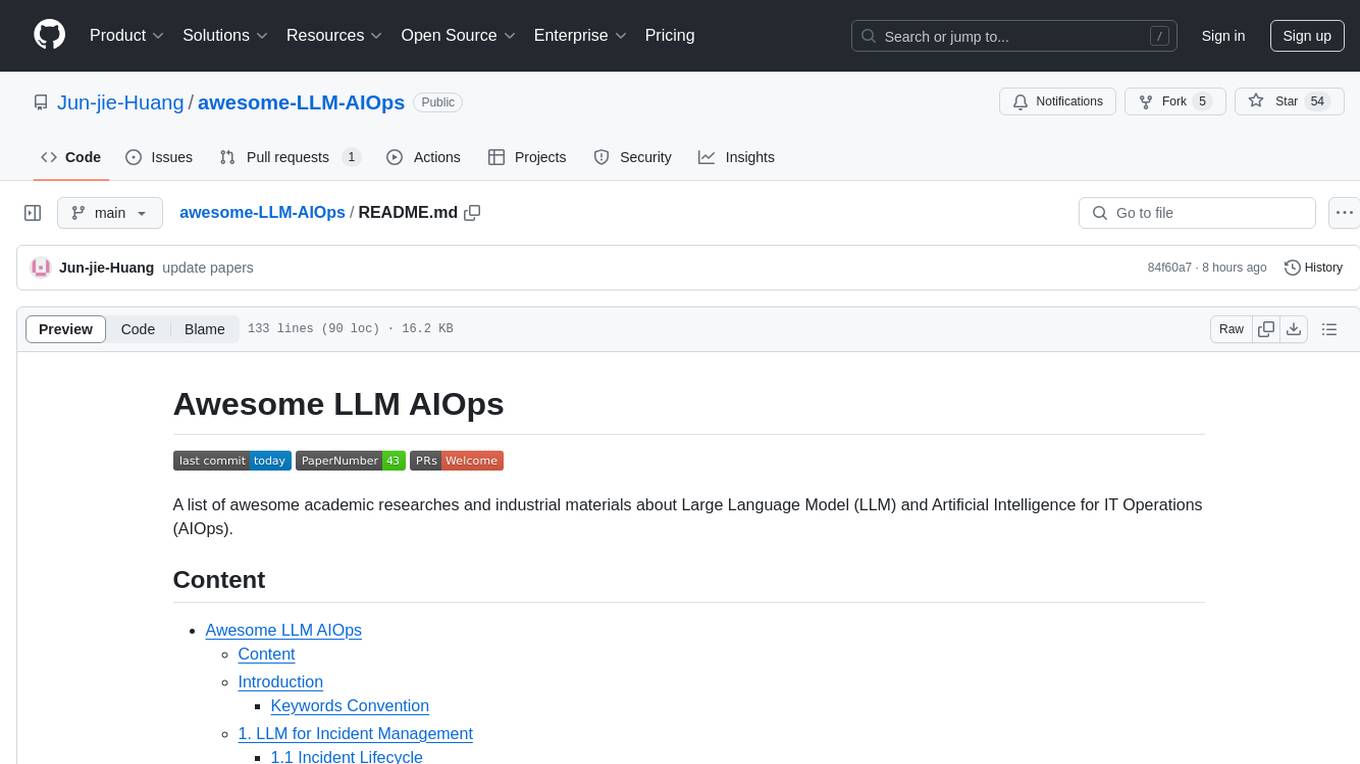
awesome-LLM-AIOps
The 'awesome-LLM-AIOps' repository is a curated list of academic research and industrial materials related to Large Language Models (LLM) and Artificial Intelligence for IT Operations (AIOps). It covers various topics such as incident management, log analysis, root cause analysis, incident mitigation, and incident postmortem analysis. The repository provides a comprehensive collection of papers, projects, and tools related to the application of LLM and AI in IT operations, offering valuable insights and resources for researchers and practitioners in the field.
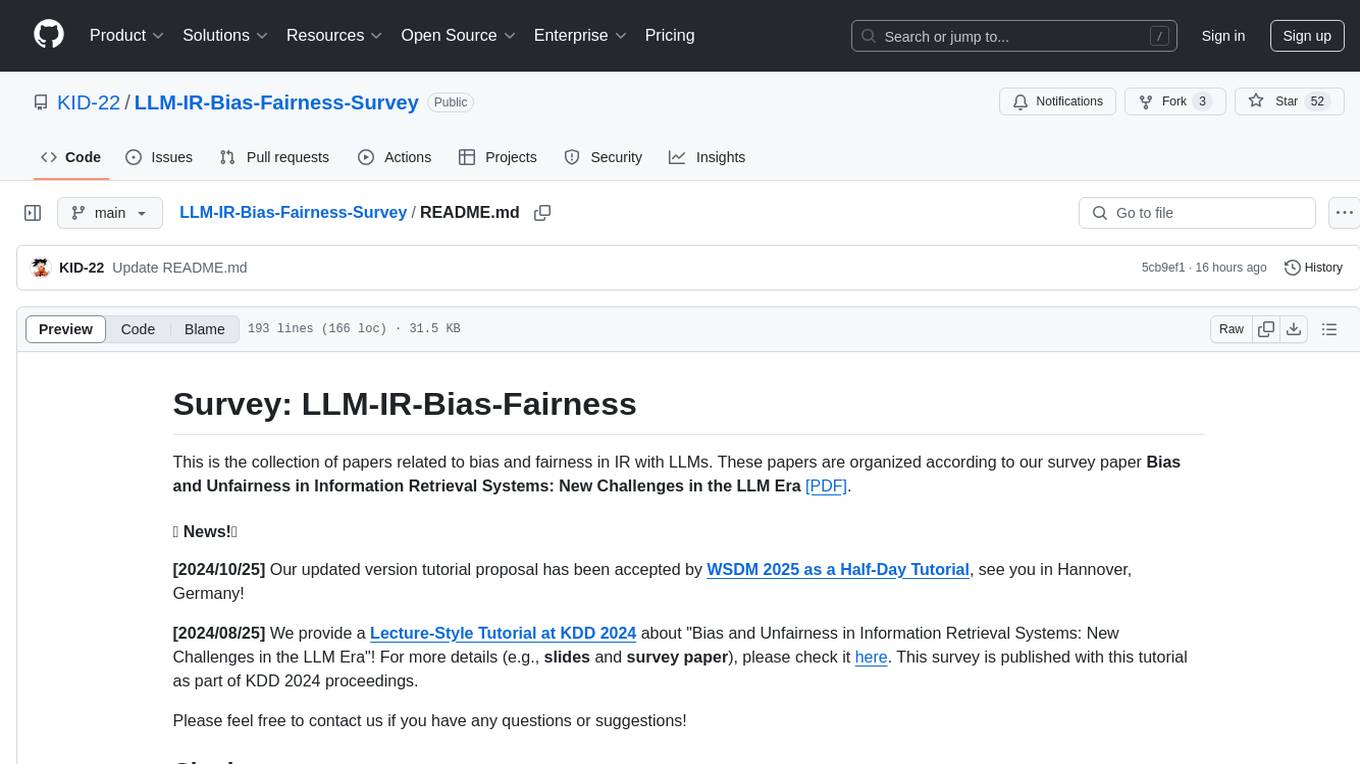
LLM-IR-Bias-Fairness-Survey
LLM-IR-Bias-Fairness-Survey is a collection of papers related to bias and fairness in Information Retrieval (IR) with Large Language Models (LLMs). The repository organizes papers according to a survey paper titled 'Bias and Unfairness in Information Retrieval Systems: New Challenges in the LLM Era'. The survey provides a comprehensive review of emerging issues related to bias and unfairness in the integration of LLMs into IR systems, categorizing mitigation strategies into data sampling and distribution reconstruction approaches.
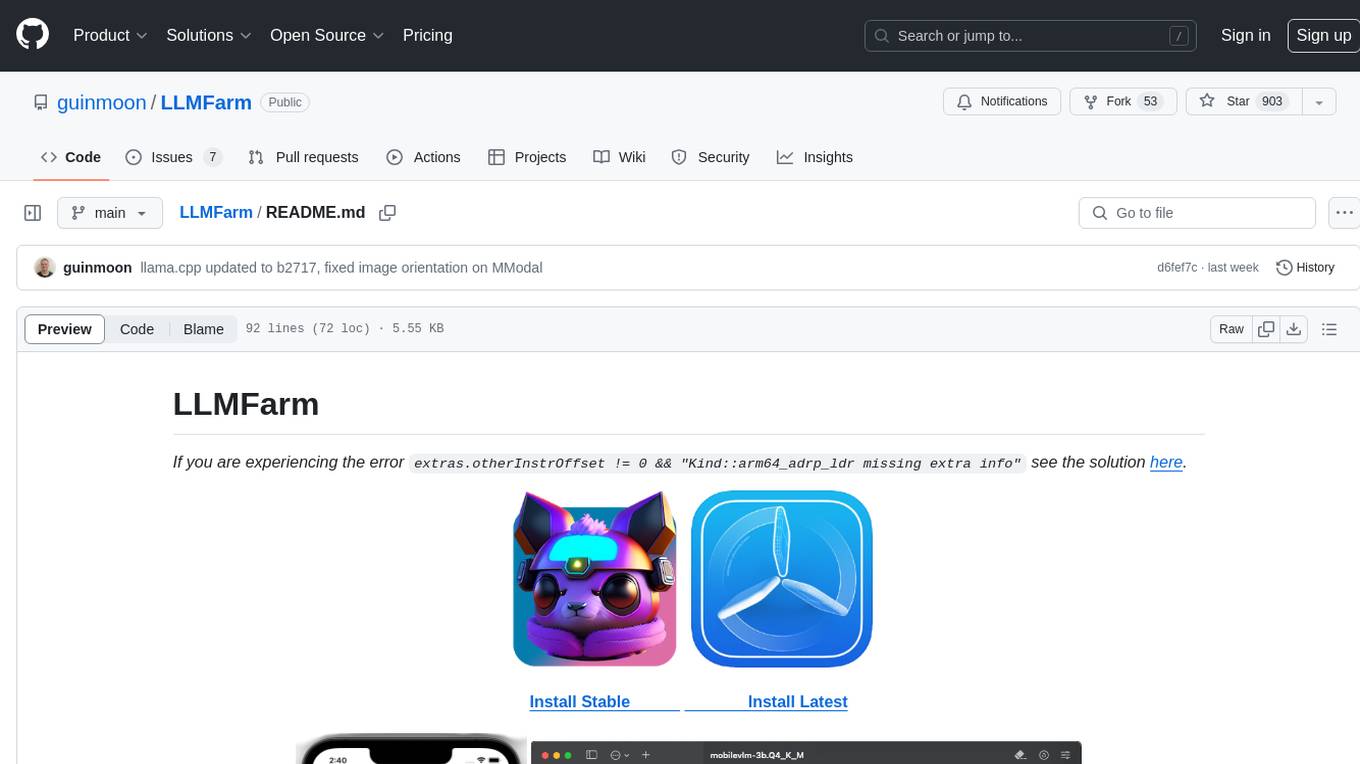
LLMFarm
LLMFarm is an iOS and MacOS app designed to work with large language models (LLM). It allows users to load different LLMs with specific parameters, test the performance of various LLMs on iOS and macOS, and identify the most suitable model for their projects. The tool is based on ggml and llama.cpp by Georgi Gerganov and incorporates sources from rwkv.cpp by saharNooby, Mia by byroneverson, and LlamaChat by alexrozanski. LLMFarm features support for MacOS (13+) and iOS (16+), various inferences and sampling methods, Metal compatibility (not supported on Intel Mac), model setting templates, LoRA adapters support, LoRA finetune support, LoRA export as model support, and more. It also offers a range of inferences including LLaMA, GPTNeoX, Replit, GPT2, Starcoder, RWKV, Falcon, MPT, Bloom, and others. Additionally, it supports multimodal models like LLaVA, Obsidian, and MobileVLM. Users can customize inference options through JSON files and access supported models for download.
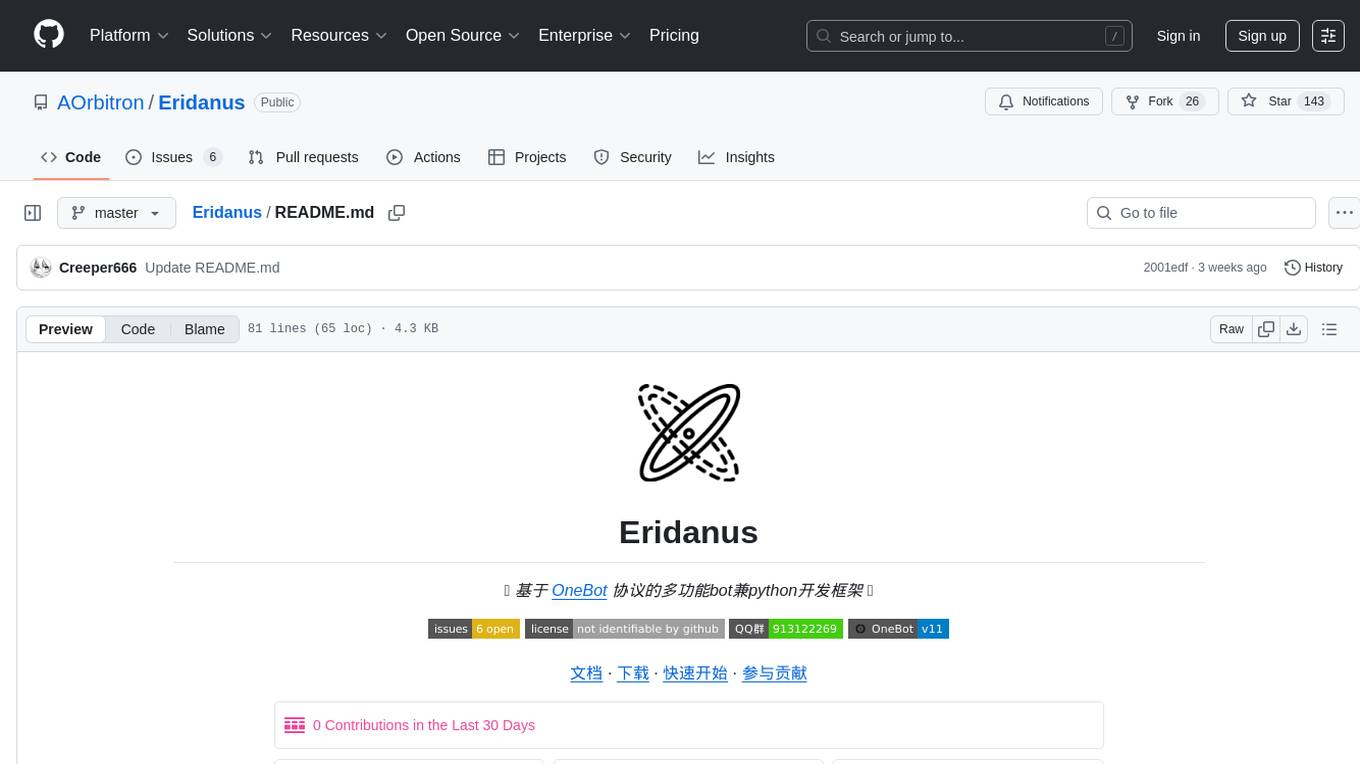
Eridanus
Eridanus is a powerful data visualization tool designed to help users create interactive and insightful visualizations from their datasets. With a user-friendly interface and a wide range of customization options, Eridanus makes it easy for users to explore and analyze their data in a meaningful way. Whether you are a data scientist, business analyst, or student, Eridanus provides the tools you need to communicate your findings effectively and make data-driven decisions.
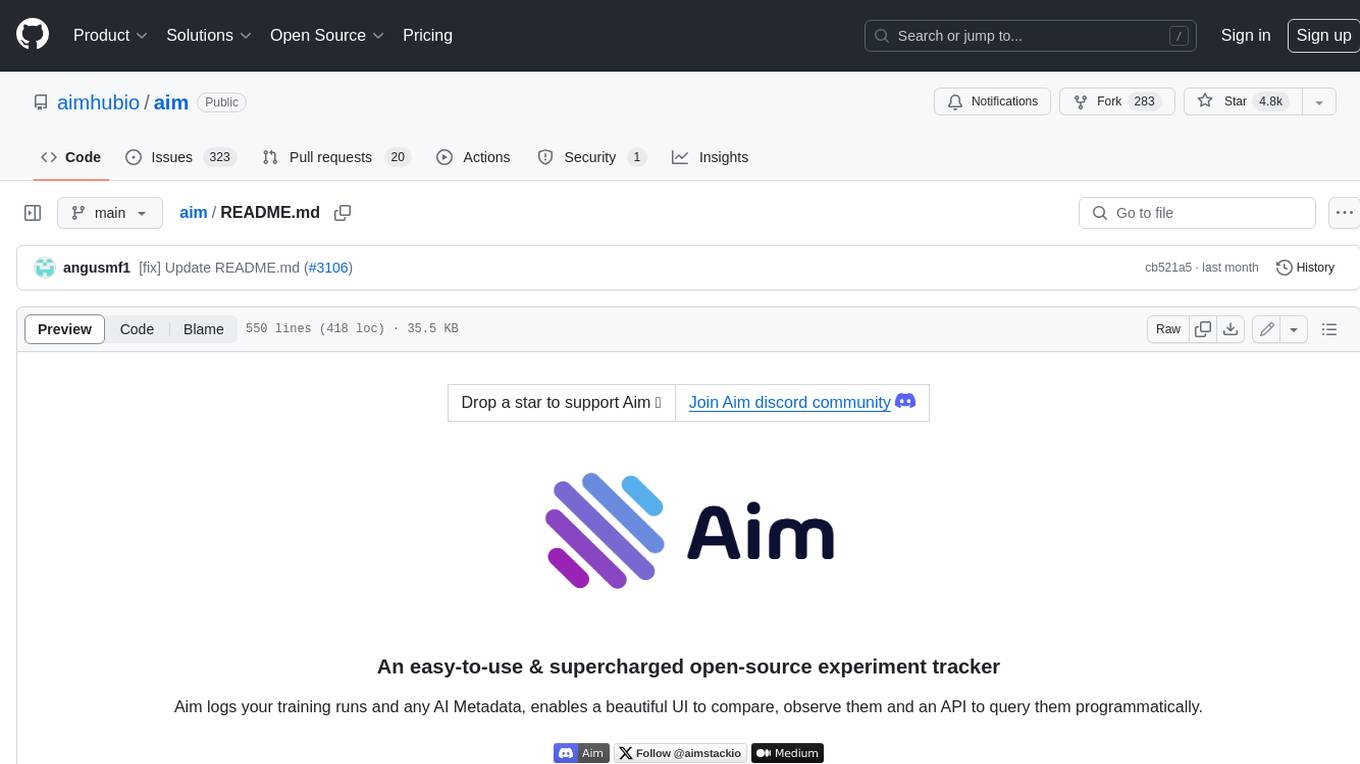
aim
Aim is an open-source, self-hosted ML experiment tracking tool designed to handle 10,000s of training runs. Aim provides a performant and beautiful UI for exploring and comparing training runs. Additionally, its SDK enables programmatic access to tracked metadata — perfect for automations and Jupyter Notebook analysis. **Aim's mission is to democratize AI dev tools 🎯**
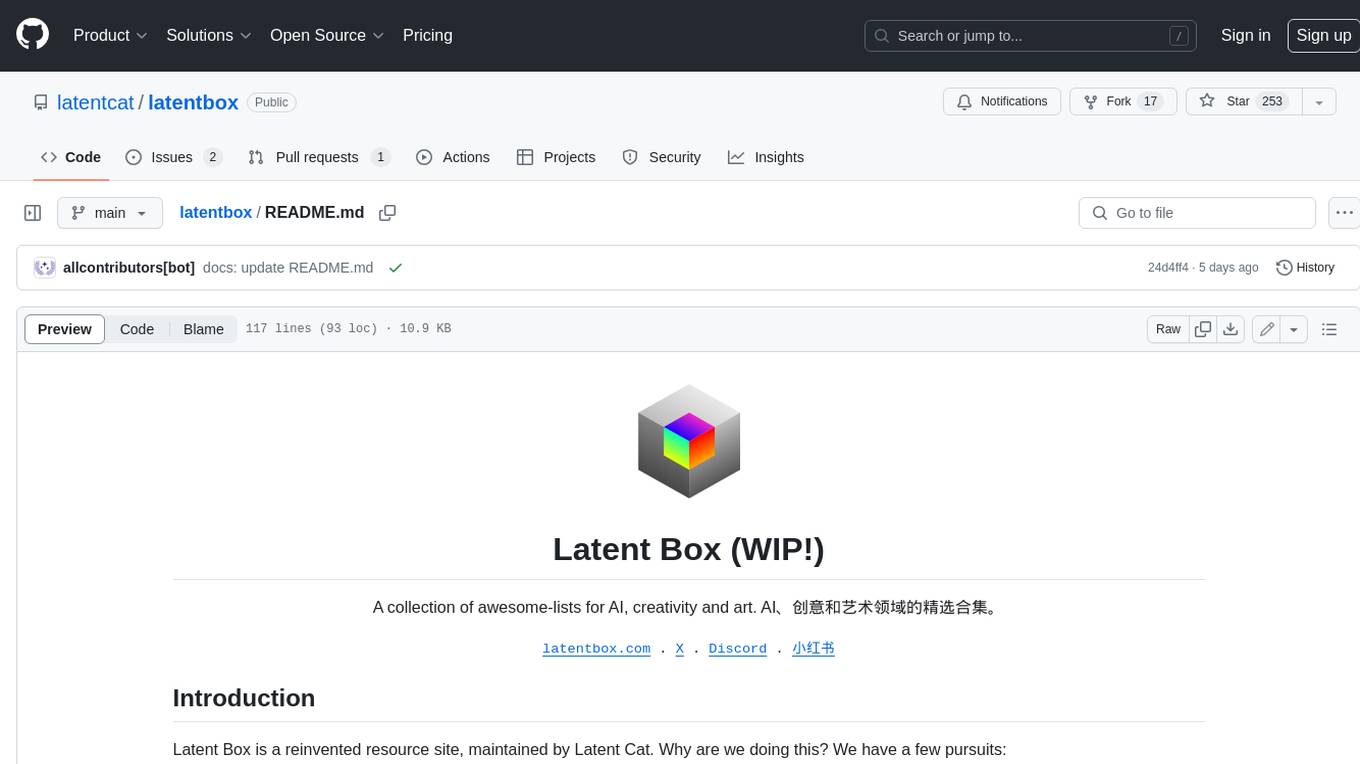
latentbox
Latent Box is a curated collection of resources for AI, creativity, and art. It aims to bridge the information gap with high-quality content, promote diversity and interdisciplinary collaboration, and maintain updates through community co-creation. The website features a wide range of resources, including articles, tutorials, tools, and datasets, covering various topics such as machine learning, computer vision, natural language processing, generative art, and creative coding.
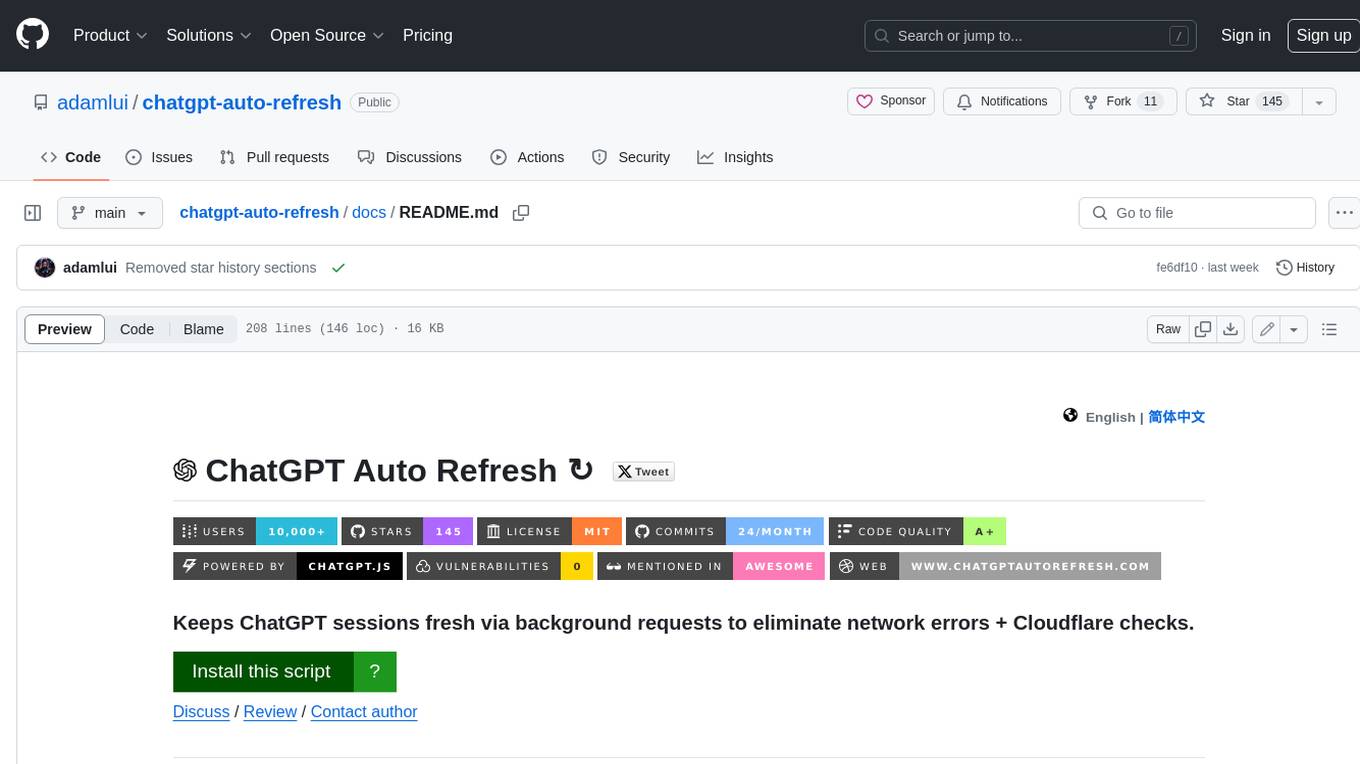
chatgpt-auto-refresh
ChatGPT Auto Refresh is a userscript that keeps ChatGPT sessions fresh by eliminating network errors and Cloudflare checks. It removes the 10-minute time limit from conversations when Chat History is disabled, ensuring a seamless experience. The tool is safe, lightweight, and a time-saver, allowing users to keep their sessions alive without constant copy/paste/refresh actions. It works even in background tabs, providing convenience and efficiency for users interacting with ChatGPT. The tool relies on the chatgpt.js library and is compatible with various browsers using Tampermonkey, making it accessible to a wide range of users.
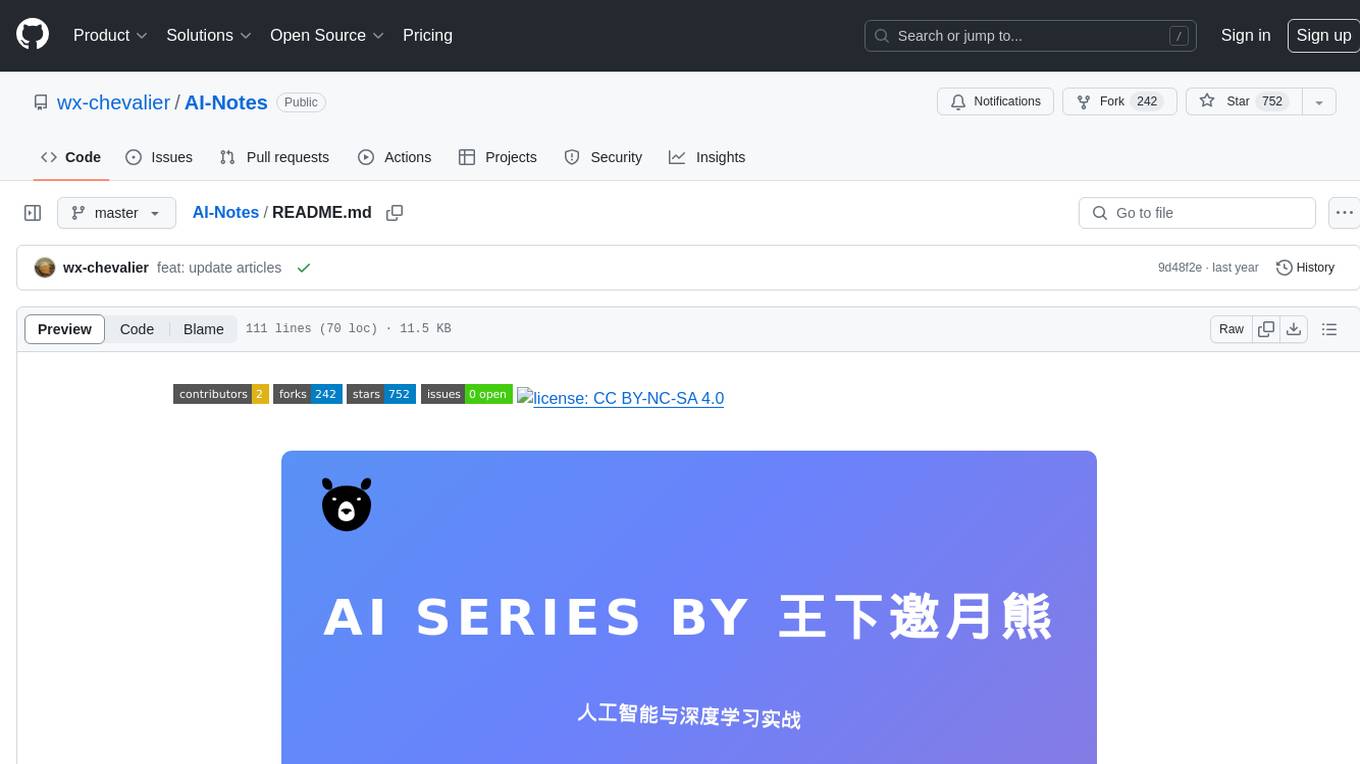
AI-Notes
AI-Notes is a repository dedicated to practical applications of artificial intelligence and deep learning. It covers concepts such as data mining, machine learning, natural language processing, and AI. The repository contains Jupyter Notebook examples for hands-on learning and experimentation. It explores the development stages of AI, from narrow artificial intelligence to general artificial intelligence and superintelligence. The content delves into machine learning algorithms, deep learning techniques, and the impact of AI on various industries like autonomous driving and healthcare. The repository aims to provide a comprehensive understanding of AI technologies and their real-world applications.
For similar tasks

Awesome-LM-SSP
The Awesome-LM-SSP repository is a collection of resources related to the trustworthiness of large models (LMs) across multiple dimensions, with a special focus on multi-modal LMs. It includes papers, surveys, toolkits, competitions, and leaderboards. The resources are categorized into three main dimensions: safety, security, and privacy. Within each dimension, there are several subcategories. For example, the safety dimension includes subcategories such as jailbreak, alignment, deepfake, ethics, fairness, hallucination, prompt injection, and toxicity. The security dimension includes subcategories such as adversarial examples, poisoning, and system security. The privacy dimension includes subcategories such as contamination, copyright, data reconstruction, membership inference attacks, model extraction, privacy-preserving computation, and unlearning.
For similar jobs

weave
Weave is a toolkit for developing Generative AI applications, built by Weights & Biases. With Weave, you can log and debug language model inputs, outputs, and traces; build rigorous, apples-to-apples evaluations for language model use cases; and organize all the information generated across the LLM workflow, from experimentation to evaluations to production. Weave aims to bring rigor, best-practices, and composability to the inherently experimental process of developing Generative AI software, without introducing cognitive overhead.

agentcloud
AgentCloud is an open-source platform that enables companies to build and deploy private LLM chat apps, empowering teams to securely interact with their data. It comprises three main components: Agent Backend, Webapp, and Vector Proxy. To run this project locally, clone the repository, install Docker, and start the services. The project is licensed under the GNU Affero General Public License, version 3 only. Contributions and feedback are welcome from the community.

oss-fuzz-gen
This framework generates fuzz targets for real-world `C`/`C++` projects with various Large Language Models (LLM) and benchmarks them via the `OSS-Fuzz` platform. It manages to successfully leverage LLMs to generate valid fuzz targets (which generate non-zero coverage increase) for 160 C/C++ projects. The maximum line coverage increase is 29% from the existing human-written targets.

LLMStack
LLMStack is a no-code platform for building generative AI agents, workflows, and chatbots. It allows users to connect their own data, internal tools, and GPT-powered models without any coding experience. LLMStack can be deployed to the cloud or on-premise and can be accessed via HTTP API or triggered from Slack or Discord.

VisionCraft
The VisionCraft API is a free API for using over 100 different AI models. From images to sound.

kaito
Kaito is an operator that automates the AI/ML inference model deployment in a Kubernetes cluster. It manages large model files using container images, avoids tuning deployment parameters to fit GPU hardware by providing preset configurations, auto-provisions GPU nodes based on model requirements, and hosts large model images in the public Microsoft Container Registry (MCR) if the license allows. Using Kaito, the workflow of onboarding large AI inference models in Kubernetes is largely simplified.

PyRIT
PyRIT is an open access automation framework designed to empower security professionals and ML engineers to red team foundation models and their applications. It automates AI Red Teaming tasks to allow operators to focus on more complicated and time-consuming tasks and can also identify security harms such as misuse (e.g., malware generation, jailbreaking), and privacy harms (e.g., identity theft). The goal is to allow researchers to have a baseline of how well their model and entire inference pipeline is doing against different harm categories and to be able to compare that baseline to future iterations of their model. This allows them to have empirical data on how well their model is doing today, and detect any degradation of performance based on future improvements.

Azure-Analytics-and-AI-Engagement
The Azure-Analytics-and-AI-Engagement repository provides packaged Industry Scenario DREAM Demos with ARM templates (Containing a demo web application, Power BI reports, Synapse resources, AML Notebooks etc.) that can be deployed in a customer’s subscription using the CAPE tool within a matter of few hours. Partners can also deploy DREAM Demos in their own subscriptions using DPoC.


-589cf4)
-c7688b)
-39c5bb)













